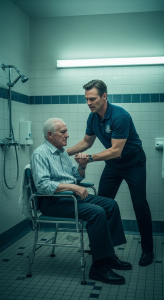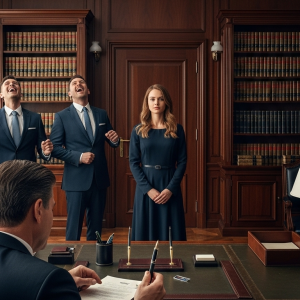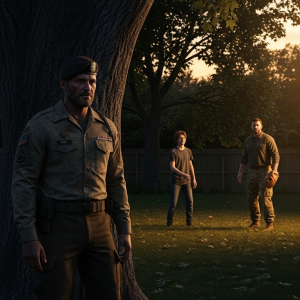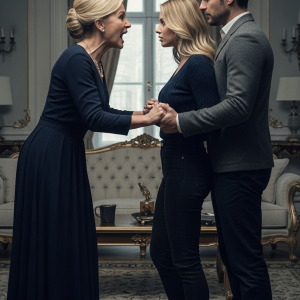Richard Harrison believed the world was a machine, and money was its fuel. From the forty-second floor of his penthouse, the city below was not a collection of human lives, but a vast and intricate circuit board that he was mastering. The blinking lights of traffic, the glowing towers—they were all just assets and liabilities, wins and losses.
He swirled the amber liquid in his crystal glass, the ice clinking softly. His phone buzzed on the granite countertop, and he glanced at the screen: Clara. He sighed, a sound of profound annoyance, before tapping the screen. “Clara, I’m in the middle of closing a deal. This can’t be important.”
His sister’s voice was small but persistent, filtering through the phone’s speaker. “I was just at Sunrise Meadows, Richard. Dad… he seems so lonely. He didn’t want me to leave.”
Richard pinched the bridge of his nose, his patience wearing thin. “He’s eighty-two and in a nursing home. Of course he’s lonely. That’s the nature of the thing. We’re paying for his care, are we not? And might I remind you, the less we spend on that dreary place, the more there is to preserve the estate.”
“It’s not about the money,” Clara insisted, her voice gaining a rare edge of frustration. “He’s our father. He asked about you again. I told him you were busy with work.”
“Because I am,” Richard snapped. “Building the legacy he started. He should be proud.” In one of his last, rare visits months ago, his father, frail but with eyes as sharp as ever, had looked at him and said, “One day, son, you’ll have to learn the value of time and sacrifice. They are currencies far more valuable than the ones you trade.” Richard had dismissed it as the sentimental ramblings of an old man.

He ended the call with a curt goodbye and turned back to his view. He saw the future as a straight line leading to one inevitable event: inheriting his father’s fifty-million-dollar fortune. It was his birthright, the grand prize for a life lived correctly. He had no idea his father had spent his final, lucid years forging not a prize, but a crucible.
The law office of Franklin & Tate was a temple of old money and discreet power. The air smelled of worn leather, polished mahogany, and paper—the kind of paper that could build empires or shatter them. Richard sat confidently in a plush armchair, his tailored suit a perfect armor of success. He gave his sister a condescendingly sympathetic glance.
Clara sat opposite him, her hands folded in the lap of her simple dress. She was a schoolteacher; she knew the value of a dollar because she had to count every one. She expected nothing from this meeting but the cold, legal confirmation of her own disinheritance. She had made her peace with it long ago. Her weekends with her father were not an investment; they were a devotion.
Mr. Franklin, the family’s lawyer for forty years, cleared his throat. He put on his reading glasses and unfolded the will with a solemn rustle. “I will now read the last will and testament of Mr. Charles Harrison,” he announced to the silent room.
He began with the usual legal formalities, then came to the heart of the matter. “All of my worldly assets, including all properties, stocks, bonds, and liquid capital, with a current estimated value of fifty million dollars, I bequeath in their entirety to my beloved son, Richard Harrison.”
A slow, triumphant smile spread across Richard’s face. He had won. He leaned back in his chair, the picture of satisfaction, and resisted the urge to look at his sister. He didn’t want to see the disappointment on her face. It was unseemly.
Clara felt a familiar pang of hurt, but it was dull, expected. She simply stared at the patterns on the Persian rug, bracing herself for the end of the meeting.
But Mr. Franklin hadn’t finished. He paused, letting the silence in the room stretch until it was taut. He took off his glasses and looked directly at Richard, his expression unreadable. “However,” he said, the single word cutting through the still air, “there is a condition. A binding and non-negotiable codicil.”
Richard’s smile faltered. He sat up straighter. “A condition?”
Mr. Franklin put his glasses back on and continued reading, his voice now a clear, unpitying monotone. “In order to claim this inheritance, my son, Richard, must, within thirty days of this reading, resign from his current employment and relinquish his current place of residence.”
The lawyer paused again, letting the words sink in. Richard’s face was a mask of confusion.
“He will then move into the designated family suite at the Sunrise Meadows Assisted Living Facility. For a period of five consecutive years, he must serve as the primary caregiver for myself, Charles Harrison. His duties will include, but are not limited to, personally assisting with all meals, bathing, dressing, and providing daily companionship.”
The room was utterly silent. Richard’s face had gone from confident to confused to utterly aghast. The color drained from his cheeks, his mouth slightly agape. Clara looked up from the floor, her eyes wide with disbelief.
And then, Mr. Franklin delivered the final, devastating blow. The checkmate, planned years in advance by a dying king.
“The terms of this codicil are absolute,” he read, his voice like a judge’s gavel. “The administration of Sunrise Meadows will provide me with a monthly report on Richard’s performance. Should Richard refuse these terms, or should he, at any point during the five-year period, fail to fulfill his duties in a dedicated and compassionate manner, this entire bequest to him will be rendered null and void.”
He looked up, first at the stunned Richard, and then at the bewildered Clara. “In such an event, the entirety of the fifty-million-dollar estate shall be transferred, immediately and irrevocably, to my beloved daughter, Clara Harrison.”
Thirty days later, Richard Harrison stood before the entrance to Sunrise Meadows. He hadn’t driven here in his imported sports car; he had taken a taxi. His penthouse, with its panoramic views, was gone. His high-powered career was gone. His custom-made suits were packed away, replaced by jeans and polo shirts that felt like a costume.
The facility was even more depressing than he remembered. The air hung thick with the scents of disinfectant and boiled vegetables. A game show blared from a television in a common room where a handful of residents sat staring into space. This was not just a place to visit for an hour. This was his new home. His prison.
His designated room was small and beige, with a single window overlooking a manicured but lifeless patch of lawn. A connecting door led to his father’s room. He pushed it open and saw him, sitting in a wheelchair, looking out the same window. His father turned his head, and for a moment, Richard saw a flicker of something in his eyes—not triumph, but a deep, profound sadness.
“Hello, Richard,” Mr. Harrison said, his voice frail but clear.
“Hello, Dad,” Richard replied, the words feeling foreign and heavy in his mouth.
The first day was a symphony of humiliation. At lunchtime, a nurse showed him how to spoon-feed his father, whose hands trembled too much to hold a fork steady. Richard, a man who commanded boardrooms, found his own hands shaking as he lifted the spoon of lukewarm mashed potatoes. His father’s quiet dignity throughout the process only made it worse.
Later, he had to help his father bathe. In the sterile, tiled bathroom, under the harsh fluorescent lights, Richard was forced to confront the stark reality of aging. He had to tend to the frail, failing body of the man he had effectively abandoned. Every moment was a visceral reminder of the will, of the trap his father had so brilliantly set. He wasn’t just caring for his father; he was working for Clara, earning her fortune with every demeaning task. The thought was a bitter acid in his stomach.
The first year was a blur of resentment. Richard moved through his days like a machine, performing his duties with a cold, robotic efficiency. He was civil to his father, but silent. He viewed every task as a transaction, a down payment on an inheritance he felt was being held hostage.
He lost track of the stock market, of the corporate world he once ruled. His world shrank to the dimensions of two small rooms, to the rhythm of medication schedules and meal times. He saw Clara every weekend. She would bring homemade food for their father and would sit with them, her presence a quiet, unintentional reminder of the power she now held over him. She never lorded it over him, but her kindness was almost worse than scorn.
The change began not as a lightning bolt, but as a slow, creeping dawn. It started with conversations. In the long, quiet afternoons, his father began to talk. Not about business or money, but about his past. He told stories of his childhood during the Depression, of meeting Richard’s mother, of the fears and joys of his life. For the first time, Richard saw his father not as a patriarch or a wallet, but as a man.
One evening, about two years in, his father was struggling to remember a story. His frustration was palpable. “It’s just… gone, Richard. The memories are like smoke.” Without thinking, Richard reached out and put a hand on his father’s shoulder. “It’s okay, Dad. Tell me the part you remember.” It was the first time he had touched him with genuine affection in decades.
He started to see the humanity in the other residents, too. He learned their names, their stories. These were not just old people waiting to die; they were former engineers, artists, and soldiers, each with a life as rich and complex as his own had been. His father’s lesson—“Money buys comfort, but not character”—began to echo in his mind, no longer as a rebuke, but as a truth. He was being stripped of comfort, and for the first time, forced to build character.
Mr. Harrison passed away peacefully in his sleep four and a half years into Richard’s sentence. Richard was the one who found him. He didn’t feel relief. He felt a profound, gut-wrenching loss. He sat by the bed for hours, holding his father’s cold hand, and wept for the man he had only just gotten to know. He dutifully completed the final six months of his term, now caring for an empty room, a ghost of a man, honoring the spirit of the will.
On the five-year anniversary of the will’s reading, Richard walked out of Sunrise Meadows for the last time. He was forty-five years old, but he felt both older and younger. The fifty million dollars was now legally his. The machine of the world he had once worshipped was waiting for him. But he was no longer the same operator.
A week later, he asked Clara to meet him at a quiet cafe. She came, looking nervous, unsure of what to expect from this new version of her brother. Richard was leaner, his face softer, the arrogant fire in his eyes replaced by a calm, steady light.
He didn’t waste time with small talk. He slid a thick portfolio across the table. “These are the transfer documents,” he said, his voice even. “I’ve had the lawyers split the entire estate down the middle. Twenty-five million. It’s yours.”
Clara stared at him, speechless. “Richard, you don’t have to do this. You fulfilled the terms. You earned it.”
Richard shook his head, a small, sad smile on his face. “No, I didn’t,” he said. “You did. You earned it every weekend you drove three hours to sit with him. You earned it with every meal you brought, every book you read to him. I was just the unpaid intern he hired to manage your inheritance.”
He finally looked her in the eye, and for the first time, she saw true remorse. “He didn’t trap me, Clara. He saved me. I spent my whole life chasing numbers on a screen, and he forced me to learn what was real. He didn’t just leave us money; he left us a second chance.”
He reached across the table and put his hand over hers. “I’m sorry. For everything.”
Clara’s eyes filled with tears as she looked at the brother she thought she had lost forever. The father’s will had not been an act of revenge. It was a desperate, brilliant, and ultimately successful act of love. He hadn’t just passed down an estate; he had restored a family. And that was the only inheritance that truly mattered.




